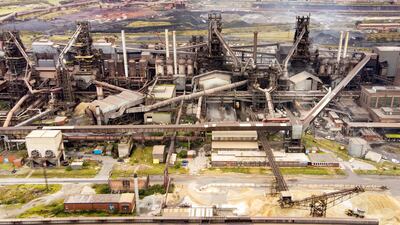The UK was urged on Wednesday to turn to hydrogen for steel production as climate plans drive up demand for the carbon-intensive metal.
Steel use could jump by a quarter because it is used to make green tech such as wind turbines, solar panels and electric vehicles, experts say.
Making steel in 1,000°C blast furnaces is one of the UK's dirtiest sectors, accounting for more than a seventh of its industrial emissions.
Driving up carbon-heavy steel production would run counter to the UK's goal of reaching net zero by 2050.
Using steel more efficiently – for example by salvaging greater amounts of scrap metal – could curb demand but Britain should also encourage a move to cleaner fuels in the sector, said a report by the Green Alliance think tank.
This could involve using hydrogen instead of coal to produce iron, the major component of steel. Germany has its eye on this method to modernise its own steelworks.
Campaigners also want the British steel industry to embrace electric arc furnaces instead of the traditional coke-fired type.
“Other countries are offering their steel industries sizeable subsidies to invest in modern production plants but UK action on industrial decarbonisation so far has progressed slowly,” the report said.
“A shift away from coal to hydrogen direct reduction is needed as this stage is the source of most of the sector’s carbon emissions.”
One demand is that the government should fund a “hydrogen direct reduction facility” to supply low-carbon iron to UK industry.

Hydrogen is only produced in small, expensive quantities at present and it is estimated that the switch would add 30 per cent to the cost at market rates.
Another suggestion is that clean power is transmitted directly to the steel industry rather than going via the expensive national grid.
Verner Viisainen, a Green Alliance policy analyst, said that if government support “doesn’t materialise soon, it could mean the end of the UK's steel industry”.
Britain was once one of the world's top steelmakers but production has been in decline for decades. One of Europe's biggest blast furnaces was demolished in Teesside last year.
Mr Viisainen said making steel for electric vehicles would be a “key market for the industry” and potentially a source of high-quality scrap metal.
Steel manufacturers who supply the clean energy industry could be rewarded with lower prices, he said.
“Any sort of decarbonisation effort in the UK has to be done in conjunction with action on electricity prices and there is really no future for the UK steel industry until that is resolved.”


